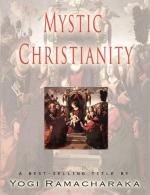In these lessons we have tried to give you the Key to the Mysteries, but unless you have studied the other lessons in which the Occult Teachings have been set forth, you will not be able to see their application in Mystic Christianity. You must bring Knowledge to these lessons, in order to take away knowledge.
THE ELEVENTH LESSON
THE ANCIENT WISDOM.
The doctrine of Metempsychosis or Re-incarnation has its roots deeply imbedded in the soil of all religions—that is, in the Inner Teachings or Esoteric phase of all religious systems. And this is true of the Inner Teachings of the Christian Church as well as of the other systems. The Christian Mysteries comprised this as well as the other fundamental occult doctrines, and the Early Church held such teachings in its Inner Circle.
And, in its essence, the doctrine of Re-birth is the only one that is in full accord with the Christian conception of ultimate justice and “fairness.” As a well known writer has said concerning this subject:
“It relieves us of many and great difficulties. It is impossible for any one who looks around him and sees the sorrow and suffering in the world, and the horrible inequality in the lives of men—not inequality in wealth merely, but inequality in opportunity of progress—to harmonize these facts with the love and justice of God, unless he is willing to accept this theory that this one life is not all, but that it is only a day in the real life of the soul, and that each soul therefore has made its place for itself, and is receiving just such training as is best for its evolution. Surely the only theory which enables a man rationally to believe in Divine justice, without shutting his eyes to obvious facts, is a theory worthy of study.
“Modern theology concerns itself principally with a plan for evading divine justice, which it elects to call ‘Salvation,’ and it makes this plan depend entirely upon what a man believes, or rather upon what he says that he believes. This whole theory of ‘salvation,’ and indeed the theory that there is anything to be ‘saved’ from, seems to be based upon a misunderstanding of a few texts of scripture. We do not believe in this idea of a so-called divine wrath; we think that to attribute to God our own vices of anger and cruelty is a terrible blasphemy. We hold to the theory of steady evolution and final attainment for all; and we think that the man’s progress depends not upon what he believes, but upon what he does. And there is surely very much in the bible to support this idea. Do you remember St. Paul’s remark, ’Be not deceived, God is not mocked; whatsoever a man soweth, that shall he also reap’? And again, Christ said that ’They that have done good shall go unto the resurrection of life’—not they that have believed some particular doctrine. And when He describes the day of judgment, you




